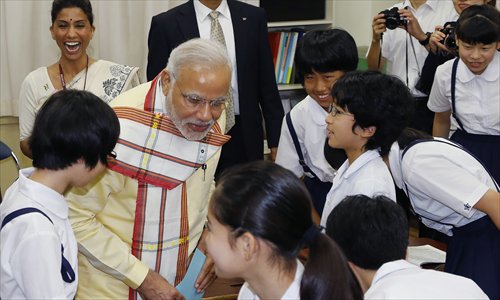Modi on the move
India’s new prime minister reshaping the country’s foreign policy

Indian Prime Minister Narendra Modi talks with students as he visits Taimei Elementary School in Tokyo on September, 1. Photo: IC
Ever since he came to power in May this year on the back of a thumping majority, India's new Prime Minister Narendra Modi has surprised all with his proactive foreign policy - reaching out to neighbors, interacting with major powers, including the US and China, appealing to foreign countries to "Come, Make in India," but also drawing the red lines where the interests of the country are concerned.
Xi and Modi meeting draws focus
All eyes are now focused on Chinese President Xi Jinping's three-day India visit that begins September 17.
In May, Prime Minister Narendra Modi invited Chinese President Xi Jinping to visit India, seeking greater engagement between the world's two most populous nations in trade and regional security.
Modi told Prime Minister Li Keqiang during a telephone call in May, "China was always a priority in India's foreign policy" and underlined the Indian government's resolve to "utilize the full potential of our strategic and cooperative partnership with China."
Former Indian envoy and a well-known China expert T.C.A. Rangachari feels that India-China relations are going strong, and that India's ties with Japan have nothing to do with the New Delhi-Beijing equation.
He told the Global Times that the fact that Chinese President Xi is coming to India is proof enough of the two countries' strong bilateral ties. "Chinese Foreign Minister Wang Yi was here earlier, and Modi and Xi Jinping have met in Fortaleza in Brazil in July, and a long communiqué was issued at BRICS and at the bilateral level … Both sides are talking in terms of the importance they attach to the relationship."
Well-known China expert Srikanth Kondapalli feels that "India-China relations are improving, but not enough to make [the two] very close."
Talking to the Global Times, Kondapalli said that Modi's visit to Japan would have "indirect" impact on ties with China. "All bilateral relations have an impact on a third [party], although these two are careful to say it is not impacting."
"For example, if China develops its relations with Pakistan, obviously it has an impact on India but they will not say they are targeting India, so likewise when the Indian prime minister and the Japanese prime minister are talking to each other, there is the regional context in mind," he said.
Kondapalli said that India-China relations have steadily expanded since 1988. "From then on we have kind of stable relations, but obviously we have a territorial dispute with China, that is one key problem. Then there is a concern that China-Pakistan, China-Bangladesh or relations with others have resulted in some dilemmas in India," he said.
Modi's focus on relations with other neighboring countries has also come as a pleasant surprise to many. His invitation to the heads of states of many nearby nations, particularly Pakistani Prime Minister Nawaz Sharif, to attend his May 26 swearing-in has been hailed as a diplomatic master-stroke. He held short bilateral talks with the eight neighbor countries, including Mauritius, on the sidelines the following day - a move which helped assuage any concerns the countries may have had.
Building ties near and far
In his first official visit as prime minister, he stopped in close neighbor Bhutan, putting into practice his government's policy of rebooting relations with nearby countries. His next visit was Nepal, in the first bilateral visit to Nepal by an Indian prime minister in 17 years. The outreach to both countries holds significance as the two share border with China.
The Modi government's interaction with Pakistan has been different from that of the earlier government. Though Prime Minister Modi and his Pakistani counterpart hit it off well at their first meeting in May and exchanged gifts, the prime minister did not hesitate to call off the August 25 foreign secretary level talks over their envoy hobnobbing with Kashmiri separatists.
But Prime Minister Modi has not let that event cloud ties, and has said he is ready to take talks forward. He has also offered help to Islamabad to tackle the floods rampaging through Pakistani-administered Kashmir.
Modi made Japan the first foreign port of call beyond the Indian subcontinent, and the bear hug he exchanged with Japanese Prime Minister Shinzo Abe conveyed the closeness of the relationship between the two countries. Japan has been consistently assisting India's economic rise through aid, investment and technology transfer. During the current visit, Tokyo pledged $35 billion assistance, while the two sides also upgraded their ties to a "Special Strategic and Global Partnership" meant to emphasize increased economic and defense cooperation.
Modi said the term Special Strategic and Global Partnership "is not just a play on words, but a decision that reflects the solemn responsibilities of our two governments and two countries."
Modi is also reaching out to countries further afield. After talks with President Xi, Modi will head to the US at the end of September for summit level talks with US President Barack Obama.
The US, which declined him a visa following the 2002 Gujarat riots, has been going all out to woo Modi - the leader of 1.2 billion people and a $1.8 trillion economy.
Washington sent three senior officials, including US Secretary of State John Kerry and Defense Secretary Chuck Hagel, to interact with the Modi government ahead of his meeting with Obama.
Interspersed with these important visits, the Modi government has held diplomatic meetings with senior ministers and envoys, including those of the US, the UK, China, Australia and France, who all came to touch base with the new government.